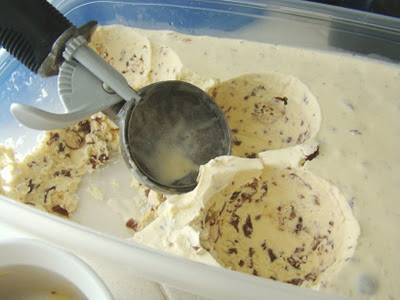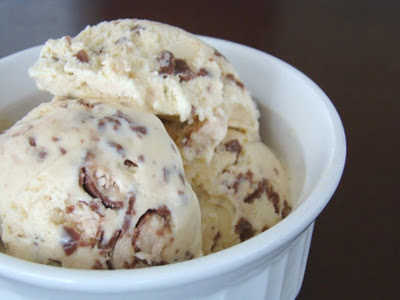Malted Milk Ice Cream
Sidebar: On a very selfish note, if you want to avoid being given more crazy looking socks or self-help books or handbags made of seatbelts or things of this nature and instead get things you'd really want for holidays or your birthday, well, my advice to you is to start a blog about something specific that you love and make sure everyone you know knows about it.
If I had to pick a few favorites out of my holiday gift bunch, they would have to be a totally adorable and Midwestern gift of a crisp, white apron with the name of this blog embroidered on it from my aunt, the Tartine cookbook plus a sparkly, hot pink Le Creuset silicone spatula from my sister, and the long-coveted ice cream attachment for my KitchenAid mixer from my mom and dad. I've broken in the first three gifts several times over by now, but had yet to even take the poor ice cream maker out of the box until very recently. And thankfully, when I did finally get the ice cream maker whirring I did it the right way and chose a recipe from David Lebovitz's practically-perfect-in-every-way ice cream cookbook The Perfect Scoop before I even figured out what a dasher is.
For my first ice cream experiment, I finally settled on the Malted Milk Ice Cream. Now, I hadn't had malted milk anything in, oh, I don't know how long, but just reading the recipe had my eyes wide and mouth watering for it and all things malted and milky. I couldn't wait to whip up a batch of this ice cream; I needed it at that very moment. Unfortunately, ice cream making doesn't offer instant gratification, and certainly not if you haven't actually read the ice cream maker's instructions and tuned into the "freeze the bowl for at least 15 hours before using" part of the equation. Shake fists here.
But I gathered my patience. And I froze bowls and shopped for ingredients (three stores alone just to find malted milk powder, people!) and chilled custard and busted up malted milk balls and waited for the soft, baby ice cream to freeze and firm up into its final delicious form. And all told, it was worth the wait. I mean, I know the unbelievable joy of fresh, house-made ice cream, but when it's actually made in one's own house, it really is something else altogether. Like making homemade marshmallows, there is something to be said for making something decadent with one's own hands (albeit with the aid of kitchen gadgetry) that could be much more easily and quickly obtained from the corner store.
Like I'd heard about all of Lebovitz's brilliant recipes, the ice cream itself was dense, had a gorgeous texture and indeed seemed like it would live up to the "one perfect scoop" concept (make an ice cream so rich and delicious that one small, perfect scoop is all anyone would ever need). On the flip side, maybe I found this particular ice cream to be a bit too much for even one perfect scoop; it was so full of heavy cream and yolks and sugar and candy that one perfect bite was all I needed at one time.
The sweetness of the ice cream base along with the addition of two cups of crushed candy was a serious sugar rush and approaching cloying territory. I kept musing aloud that I wish it had some salted nuts or something swirled through it to break up the sea of sweet (and even stirred some natural crunchy peanut butter into a small cup of the ice cream at one point--despite the added fat to an already rich situation, it really helped make it more balanced and crave-worthy). As you can tell from this blog's subject, I don't fear sugar and so of course I found the ice cream from this recipe to be tasty, but it's always going to be more of a sweet-salty balance that has me bonkers for a recipe. If I unleashed this ice cream at, say, a birthday party full of six-year-olds, they would make me President of Everything. It's all a matter of where the taster is at with this level of sweetness.
But the way the recipe steps came together like a symphony and the ice cream itself set up perfectly has me marking several of the book's recipes for my ice cream making to-do list. For my personal tastes, I might be seeking out the recipes that use whole milk or half and half instead of mostly heavy cream and less egg yolks and sugar from here on out, but I am excited to try more recipes from this book. Even though I wasn't dying over this recipe, I want to pass it along to you because the ice cream base itself is really delicious and the unique malted milk flavor would pair well with a variety of fruits and other, less sugary add-ins (like I said, it was really dynamite with crunchy, unsweetened natural peanut butter), and will eventually give it another go, maybe using one of Lebovitz's own add-in recipes in the back of his book instead of the crushed candy.
Malted Milk Ice Cream
From David Lebovitz's The Perfect Scoop
Makes about 1 1/2 quarts
Instead of chasing bits of malted milk balls around your countertops while trying to chop them with a knife, place the candy in a large zip top bag and give it a good bashing with the end of a rolling pin.
1 cup half-and-half
3/4 cup granulated sugar
Pinch of salt
2 cups heavy cream
1/4 teaspoon vanilla extract
2/3 cup malt powder
6 large egg yolks
2 cups malted milk balls, coarsely chopped
In a medium saucepan, warm the half-and-half, sugar, and salt. Meanwhile, in a large bowl, whisk together the heavy cream, vanilla, and malt powder and set a mesh strainer on top.
In a separate medium bowl, whisk together the egg yolks. Slowly pour the warm mixture into the egg yolks, whisking constantly, then scrape the warmed egg yolks back into the saucepan.
Stir the mixture constantly over medium heat with a heatproof spatula, scraping the bottom as you stir, until the mixture thickens and coats the spatula. Pour the custard through the strainer and whisk it into the malted milk mixture. Stir until cool over an ice bath.
Chill the mixture thoroughly in the refrigerator, then freeze it in your ice cream maker according to the manufacturer's instructions. As you remove the ice cream from the machine, fold in the chopped malted milk balls. Scrape the ice cream into a freezer-safe container (big enough to hold about 1 1/2 quarts), cover and freeze until firm.

